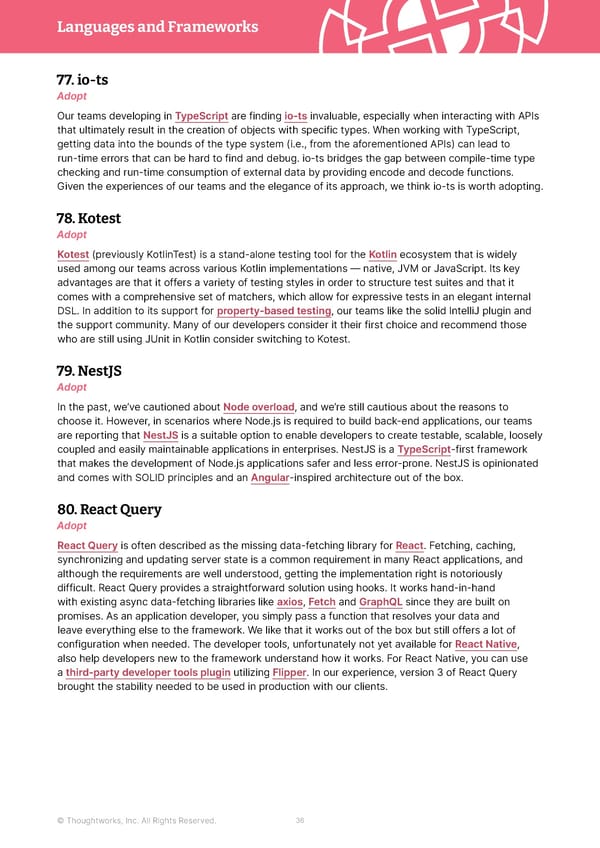Languages and Frameworks Thoughtworks Technology Radar 77. io-ts Adopt Our teams developing in TypeScript are finding io-ts invaluable, especially when interacting with APIs that ultimately result in the creation of objects with specific types. When working with TypeScript, getting data into the bounds of the type system (i.e., from the aforementioned APIs) can lead to run-time errors that can be hard to find and debug. io-ts bridges the gap between compile-time type checking and run-time consumption of external data by providing encode and decode functions. Given the experiences of our teams and the elegance of its approach, we think io-ts is worth adopting. 78. Kotest Adopt Kotest (previously KotlinTest) is a stand-alone testing tool for the Kotlin ecosystem that is widely used among our teams across various Kotlin implementations — native, JVM or JavaScript. Its key advantages are that it offers a variety of testing styles in order to structure test suites and that it comes with a comprehensive set of matchers, which allow for expressive tests in an elegant internal DSL. In addition to its support for property-based testing, our teams like the solid IntelliJ plugin and the support community. Many of our developers consider it their first choice and recommend those who are still using JUnit in Kotlin consider switching to Kotest. 79. NestJS Adopt In the past, we’ve cautioned about Node overload, and we’re still cautious about the reasons to choose it. However, in scenarios where Node.js is required to build back-end applications, our teams are reporting that NestJS is a suitable option to enable developers to create testable, scalable, loosely coupled and easily maintainable applications in enterprises. NestJS is a TypeScript-first framework that makes the development of Node.js applications safer and less error-prone. NestJS is opinionated and comes with SOLID principles and an Angular-inspired architecture out of the box. 80. React Query Adopt React Query is often described as the missing data-fetching library for React. Fetching, caching, synchronizing and updating server state is a common requirement in many React applications, and although the requirements are well understood, getting the implementation right is notoriously difficult. React Query provides a straightforward solution using hooks. It works hand-in-hand with existing async data-fetching libraries like axios, Fetch and GraphQL since they are built on promises. As an application developer, you simply pass a function that resolves your data and leave everything else to the framework. We like that it works out of the box but still offers a lot of configuration when needed. The developer tools, unfortunately not yet available for React Native, also help developers new to the framework understand how it works. For React Native, you can use a third-party developer tools plugin utilizing Flipper. In our experience, version 3 of React Query brought the stability needed to be used in production with our clients. © Thoughtworks, Inc. All Rights Reserved. 36
 Vol 27 | Technology Radar Page 35 Page 37
Vol 27 | Technology Radar Page 35 Page 37